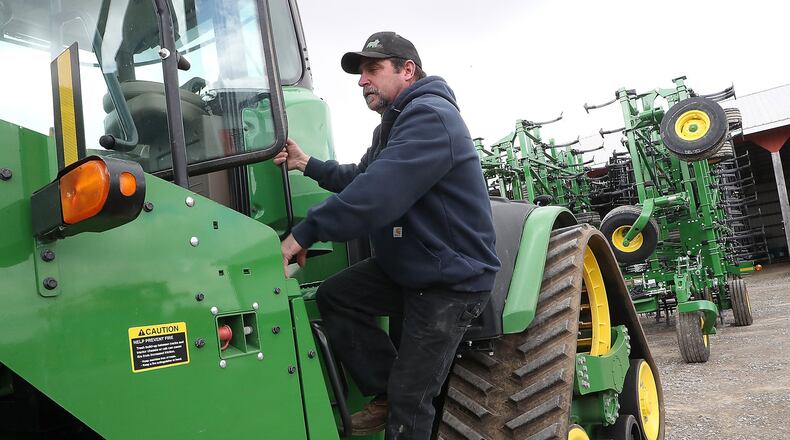Todd Bumgardner, who farms 5,200 acres in Clark County, said his four-man crew is focusing more right now on cleanliness in his shop as they prepare machinery for the planting season on his fourth-generation farm in Pleasant Twp.
“The guys working ground are pretty much on a tractor every day for the duration from start to finish,” he said. “We’re not (sharing seats) so there’s not a lot to worry about with contamination on the steering wheel, the levers and buttons.
“My biggest deal is here we try to wipe the knobs down on the main shop door.”
They have not gone so far as to wipe down tools after each use, though that could change if anyone started showing symptoms of the coronavirus.
“I guess if it gets worse it could be a huge concern, but we don’t comingle a lot with other people,” Bumgardner said.
But don’t take that to mean he is not worried overall about the spread of the virus.
“There’s a lot of places that are shut down,” he said. “My fear is that when we get planting, we may run out of supplies. I mean if this deal gets serious, we may have trouble getting seed, we might have trouble getting fertilizer. These are unknown questions in the back of my mind.”
The farm supply chain was taken into account when state officials signed a stay-at-home order in March that exempts "essential" businesses, but these days change is a constant as the number of deaths and positive cases continues to rise around the state and beyond.
“We hope we are prepared, but until you have a scare like this you just don’t know,” he said. “We take a lot of things for granted. You know, ‘It’ll be fine. It will be there.’ This deal can be pretty scary in my eyes.”
READ MORE: County official explains what makes a job essential
Champaign County Agriculture and Natural Resources Extension educator Amanda Douridas pointed out “social distancing” is not too hard for many farmers who run their own operations with few, if any, helpers, but there is a downside to having a small operation.
“If a farmer does come down with COVID-19, then sometimes they’re the only one in their operation that know how to run the planter, so while it might not have a huge impact for the food supply, it’s going to put a lot of strain on that on our local farm family that that’s affecting,” she said.
“Usually the community’s pretty good about pulling through, but you know we’ve heard about these cases where people were in the hospital for a week or two at a time, and that could be their entire planting window for the season. That’s probably the biggest concern for farmers right now.”
As such, Ohio Farm Bureau director of communications Ty Higgins said safety is being stressed to its members even more than usual.
“This this just adds a whole new level of safety that farmers really need to adapt to quickly because being essential to the supply chain doesn’t mean that it’s business as usual,” Higgins said. “I think that we really have to focus on just how important agriculture is to society and keep that food supply system intact. What I mean by that is that if we have someone in a processing plant, for instance, that gets sick and maybe spreads the virus, we might have a processing plant with some issues with getting food processed.
“If your milk truck driver gets sick and can’t pick up your milk, you have to dump it. You lose revenue, and the supply chain loses that milk, so we really want to tell farmers all across Ohio and across the country to use those CDC guidelines. Use that six-foot spacing. Use that social distancing. Be smart about sanitation.”
RELATED: Coronavirus: Clark County groceries reserve special hours for seniors, at-risk to shop
Higgins said he has heard of larger farm operations not letting employees share vehicles and equipment as they go about their typical day on the farm.
“I don’t care if it’s a dump truck or a pickup truck or a Bobcat, once they get into an implement, that’s theirs for the day,” Higgins said. “They wipe it down before they get into it, and they wipe it down when they get out of it for the day, and so all these cogs in the food supply wheel need to keep running in order to keep the store shelves stocked.”
While grain farmers might not work in close proximity to others on a typical day, the same cannot be said of those who grow so-called specialty crops – fruits and vegetables.
Douridas pointed out they must change more about their day-to-day dealings to promote preserving health for themselves and customers.
“They tend to have more employees that come in close contact with each other, I’d say, than corn and soybean farmers do just because they’re picking produce, handling it, things like that,” she said. “So they now have another added layer of employee management that they have to become aware of and get up to speed on.”
About the Author

